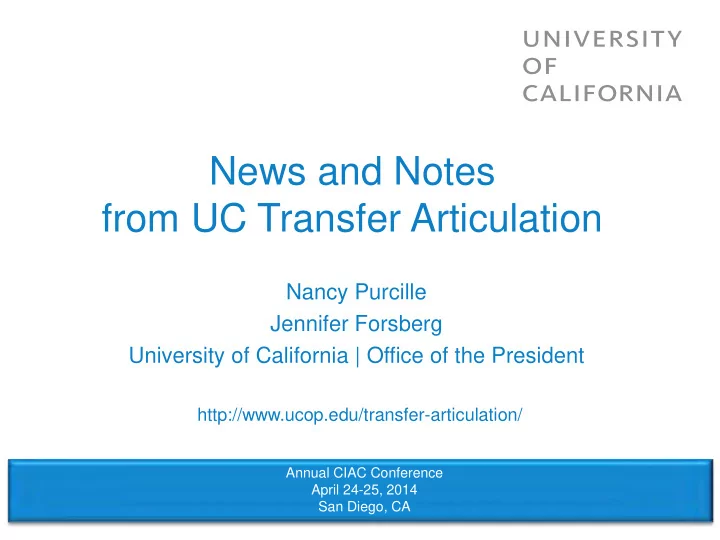

News and Notes from UC Transfer Articulation Nancy Purcille Jennifer Forsberg University of California | Office of the President http://www.ucop.edu/transfer-articulation/ Annual CIAC Conference April 24-25, 2014 San Diego, CA
What’s New o BOARS Math Statement (December 2013) • UC-transferable math courses require a prerequisite of “intermediate algebra or equivalent” • The BOARS Math Statement aims to clarify what “or equivalent” means, i.e., prerequisite(s) for UC-transferable math courses should cover the Common Core content • Our office checks for but does not evaluate the prerequisite o Statway • Re-review to begin in May for CCCs who have previously submitted materials for faculty review o IGETC for STEM • Approved for CSU & UC. Join Ken O’Donnell & Nancy Purcille at the IGETC for STEM session at 4:10pm today, Crystal Ballroom 2 2
Who’s New at UCOP o Deborah McCaskey, Transfer Articulation Analyst o Steve Handel, Associate Vice President of Undergraduate Admissions 3
Who and Where We Are at UCOP o Student Affairs: Judy Sakaki, Vice President • Admissions • Student Financial Support • Student Services o Admissions units within Student Affairs: • Articulation • Operations • Undergraduate Admissions Policy & Communication o Articulation teams within Admissions: • High School • Transfer • UC Curriculum Integration (UCCI) 4
The Transfer Course Agreement In 2013, UC Transfer Articulation evaluators reviewed over 4,400 courses for the TCA o Approximately 90% approved o Courses are denied for: • Specific reasons (e.g., lack of prerequisite, outdated textbook) • Course outline lacks sufficient information o Courses modeled on other CCCs’ previously approved outlines are sometimes denied—typically because key elements of the outline have been changed, resulting in a course that cannot be approved 5
Anatomy of an Outline General considerations o Length: • There is no minimum length required for course outlines However, very short outlines do not contain enough information to determine scope, depth and rigor o Proofing is important! • Check outlines carefully for formatting errors Proofread outlines again AFTER UPLOADING – sometimes outlines upload incompletely or incorrectly, making review difficult or impossible 6
Anatomy of an Outline General considerations o Pay attention to academic content: • A course that is practical or applied is not appropriate for transfer credit • Courses may include some practical/applied elements, but the primary focus should be academic or theoretical o Remember to complete “Out of Class Assignments” section 7
The Outline: Step-by-Step The Course Description o A robust course description helps TCA reviewers determine if a course is appropriate for transferability o Be sure that the course description clearly leads to the course objectives 8
The Outline: Step-by-Step Prerequisites/Co-requisites o Be sure the prerequisites and co-requisites sections of the outline are completed (if applicable) o To facilitate course review, please provide the course title and number (e.g., MATH 66 Intermediate Algebra, rather than simply MATH 66) o Check the Subject Area Regulations for prerequisite and co-requisite information: • http://ucop.edu/transfer-articulation/transferable-course- agreements/tca-policy/regulations-by-subject-area.html 9
The Outline: Step-by-Step Course Objectives/Course Content o The Course Objectives and Course Content sections should correlate • Example: In a History course, if Course Objectives include an understanding of the Industrial Revolution, it is expected that the Course Content would include topics, study and analysis of that period. 10
The Outline: Step-by-Step Lab Hours and Lab Content o If course includes a lab: • List the lab hours per term • Science courses with a lab component must include a clearly identified lab manual (under Textbooks) • Include Lab Content May be integrated into the Course Content section if lab activities are clearly delineated from lecture 11
The Outline: Step-by-Step Out-of-Class Assignments o Complete out-of-class assignments section • Describe the assignments: Example: in an essay of about 1,250 words (five pages), analyze Vladimir Nabokov’s Lolita, using a theoretical approach (such as feminist, structuralist, or Marxist criticism). Research the theoretical approach you adopt to support your explication of the novel. At least two sources (properly cited) about this approach are required. 12
The Outline: Step-by-Step Methods of Evaluation o How will students be evaluated? • Written examinations, including a final examination • Research paper(s) • Oral presentations • Class participation • Text reviews and/or analysis 13
The Outline: Step-by-Step Texts and Other Required Reading o List required texts • Textbooks should be published within 7 years—with the exception of classics ( Moby Dick, Sun Tzu’s The Art of War) • Please identify classics as such o List other required reading, if applicable • History courses require reading beyond a textbook 14
The Outline: Step-by-Step Textbook Considerations o Problems with textbooks can be reason for denial. For example: • Out-of-date textbooks (as noted, over 7 years old, with certain exceptions) • Textbooks not relevant to subject matter (such as a foreign- language text listed in a biology course) • Insufficient textbooks for the subject area (English Composition requires a stylebook) 15
Subject Area Regulations o The special regulations per subject area contain information relevant to specific disciplines, including: • minimum writing requirements • prerequisites and co-requisites o Check the Subject Area Regulations for information: • http://ucop.edu/transfer-articulation/transferable-course- agreements/tca-policy/regulations-by-subject-area.html 16
Questions? Nancy Purcille, Transfer Articulation Coordinator, UCOP nancy.purcille@ucop.edu 510-987-9569 Jennifer Forsberg, Articulation Analyst, UCOP jennifer.forsberg@ucop.edu 510-987-0907 Deborah McCaskey, Articulation Analyst, UCOP deborah.mccaskey@ucop.edu 510-987-0566 ASSIST Coordination Site 949-824-4385 17
Resources UC TCA & IGETC Agreements: www.assist.org IGETC information: http://icas-ca.org/igetc OSCAR – Online Services for Curriculum and Articulation Review: http://info.assist.org/oscar.html 2013 Counselor Conference Materials: http://admission.universityofcalifornia.edu/counselors/news-events/conferences/index.html 2013 Ensuring Transfer Success (ETS) Materials: http://admission.universityofcalifornia.edu/counselors/news-events/ets/index.html UC campus info: http://www.universityofcalifornia.edu/uc-system/parts-of-uc Articulation Handbook: http://ciac.csusb.edu/ CIAC mentors: http://ciac.csusb.edu/mentor.html Transfer Prep Paths: http://admission.universityofcalifornia.edu/transfer/preparation-paths/ UC Transfer Admission Planner: http://admission.universityofcalifornia.edu/transfer/transfer-admission-planner/ 18
Recommend
More recommend